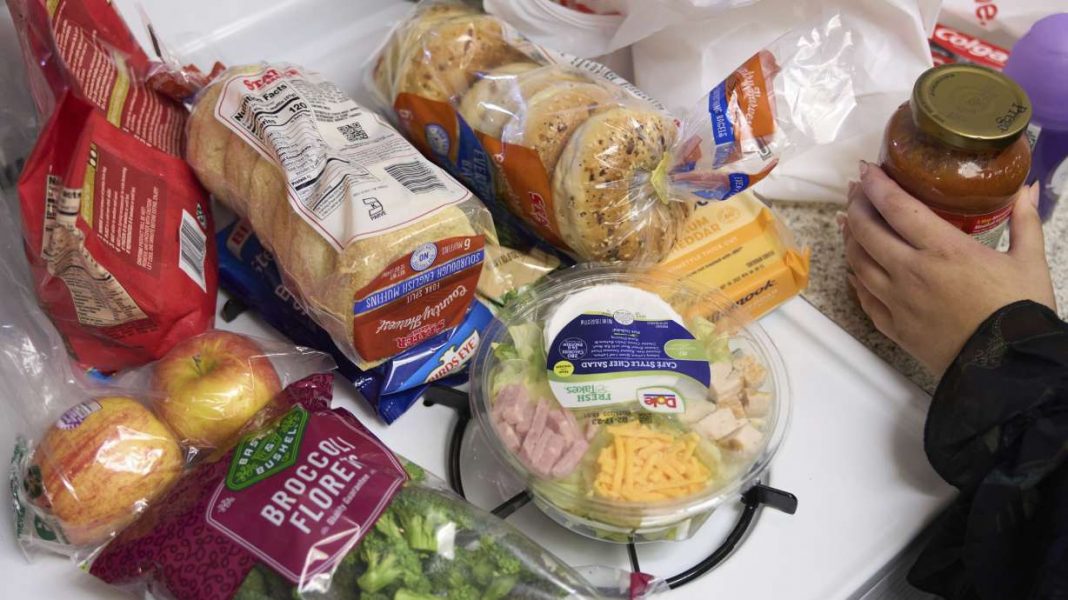LOS ANGELES — Student and legal advocacy groups are urging the U.S. Department of Agriculture to eliminate the interview requirement for Supplemental Nutrition Assistance Program applicants to receive food aid.
The groups argue that the interview requirement is a significant barrier that prevents eligible individuals from accessing the food aid they need. The National Student Legal Defense Network, the Center for Law and Social Policy, and the California Student Aid Commission are among the organizations advocating for the removal of this requirement. A spokesperson for the Department of Agriculture has confirmed that the agency is currently reviewing the proposal.
SNAP plays a crucial role in helping low-income families supplement their budgets so they can purchase groceries, snacks, and nonalcoholic beverages. Currently, an estimated 42 million Americans receive monthly benefits at an average of $212 per person or $401 per household.
Under the current regulations, within 30 days of applying for SNAP, a state agency must conduct an applicant’s initial certification interview, either by phone or in person.
Expedited interviews may be scheduled within a seven-day window for individuals in particular need who meet specific income criteria. Seasonal farm workers, migrants, and certain other households may also qualify for expedited interviews.
Eligible households then receive a notice indicating their certification period, or how long they will receive SNAP benefits. Before that period ends, the participant’s local SNAP office contacts them with information on how to recertify.
Aviana Kimani, a 24-year-old student at West Los Angeles College, shared her experience of receiving SNAP benefits for a year and a half before leaving the program. She cited the difficulty of scheduling the mandated recertification interview as one of the reasons for leaving the program.
Kimani explained that the process of going to the social services office in person to renew her eligibility during its open hours was challenging due to work and school obligations. She also mentioned that the paper-based nature of the SNAP assistance program added an extra layer of complexity, especially when she was moving and had to change her address post-move.
“You don’t get to pick the time — it’s just given to you — and, usually since it’s during the day, it can inconvenience you if you work or go to school,” Kimani said. “You also don’t know how long the call will be. If I didn’t have to go through the screening process, I definitely would have been on benefits longer. But if you don’t keep up, you’re knocked off.”
When SNAP was established in 1978, the Agriculture Department retained the interview requirement inherited from the previous food stamp program, stating that the interview helps the agency understand a household’s circumstances and helps the household understand the program.
However, the organizations petitioning the government argue that the current regulatory requirement is an outdated bureaucratic hurdle and is not mandated by the federal statute governing the SNAP program.
A 2021 review of enrollment data in California found that 31% of SNAP applicants in Los Angeles County were denied SNAP due to missing their interview, compared to just 6% who were denied for failing to meet eligibility requirements. Missed-interview denials were even higher among working families and college applicants, affecting as many as 40% of otherwise eligible applicants.
Allan Rodriguez, press secretary for the USDA, stated that 78% of people eligible for SNAP participated in the program and received benefits from October 2019 to February 2020, the last pre-pandemic period from which data is available.
During the pandemic, when interview and other requirements were eased, the USDA encouraged states to use existing program flexibility to improve access to SNAP, such as by using online or phone SNAP applications or allowing participants to stay on SNAP without reapplying for the maximum amount of time allowed.
According to Ty Jones Cox, vice president for food assistance at the Center for Budget and Policy Priorities, the changes contributed to hunger staying level in 2020, rather than increasing during the early stage of the pandemic. That’s in contrast to during the 2008 recession, when it increased from 11.1% to 14.7%.
“Hunger was poised to soar early in the COVID-19 pandemic, but SNAP’s structure and policy changes made it easier for families to access SNAP during this period,” she said.
Kimani also says the pandemic proved the policy change can be done.
“During COVID-19 they allowed people to be automatically recertified to continue their benefits, instead of using an appointment in person to determine eligibility,” she said. “I wonder why we can’t continue that way to ensure people don’t lose benefits.”
In a recent report, the Center for Budget and Policy Priorities found that the interview requirement “can be an important way for states to gather accurate information and for applicants to have their questions answered, but it can be a labor-intensive task and delay approval.”
Student Defense President Aaron Ament said the organization hears too often about obstacles students face to scheduling the required government SNAP interviews when juggling schoolwork, a job, and child care or elder care.
The Associated Press receives support from Charles Schwab Foundation for educational and explanatory reporting to improve financial literacy. The independent foundation is separate from Charles Schwab and Co. Inc. The Associated Press is solely responsible for its journalism.




Advocacy orgs call for elimination of food aid interview mandates: Agree! Less bureaucracy means faster and more efficient support to those in need. Let’s prioritize helping people over paperwork. #StreamlineFoodAid
Advocacy organizations are right! Removing interview mandates for food aid can lead to quicker and more effective assistance to those who need it most. Let’s prioritize efficiency and support for people in need.